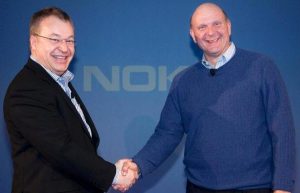The Biggest Winners & Losers In 2012

Mobile & GPS
If a world could sum up technology in 2012 it would be ‘mobile’. If you’re not in some way involved, chances are you’re in for a rocky twelve months. If you’re struggling in mobile, chances are 2012 will confirm you won’t make it back.
The easiest aspect to call is who will do well, the answer being: those who were doing well in 2011. This means another rosy year for Apple and Google in particular and iPhones, iPads and Android devices look set to flourish – especially all other tech products (whether mobile or not) look set to converge with these dominant mobile platforms in some form or other. Amazon can also face 2012 with the smug confidence of a Jeff Bezos press conference as both the Kindle and Kindle Fire look set for more bumper sales and the company already has a multimedia library to rival that of iTunes.
Similarly monstrous handset maker Samsung should again prosper while Google may breathe new life into August purchase Motorola. Sony could do well having re-emphasised its brand with the buy out of Ericsson and the wise decision to focus solely on smartphones.

Who will do badly? Yes, those who did badly in 2011. Nokia’s phone division continues to be linked with a Microsoft takeover with CEO and ex-Redmonder Stephen Elop a potential (if long denied) Trojan horse. 2012 will be make or break for RIM too. The long awaited BlackBerry 10 OS will apparently be shown off at Mobile World Congress, but it will not be released until Q4 (on supposedly just one handset) which would be the death knell for a brand which has seen its association switch from businessmen to hoodie-wearing teenage rioters. Furthermore sales of the PlayBook do not inspire confidence. HTC could also find it tough as the bigger companies focus their resources. The last two quarters have produced poor financial results for the Taiwanese firm so it again needs to show the innovation which propelled it into the spotlight.
As for everyone else in this sector, it all depends on how they integrate with popular mobile platforms. Sat nav companies will admit in 2012 apps are their future, not increasingly niche dedicated devices and mobile will drive gaming (mostly likely at the expense of the PlayStation Vita) while digital downloads which will see creditors swarming around faltering high street stores.
Winners: Apple, Google, Amazon, Microsoft, Motorola, Samsung
Losers: RIM, Nokia, HTC, Inq, dumb phones, sat navs, Sony PlayStation Vita, the high street
The Rest
With the economy still gravely ill and convergence around platforms escalating the overriding theme of 2012 will be it is not the year of comebacks. Those who have struggled in 2011 will find their day of reckoning in the next 12 months. Those who have enjoyed success will see it magnified at the expense of their failing competitors.

Away from the categories we have mentioned this theme will continue in browsers (Internet Explorer and Chrome gaining critical mass over Firefox) and social media (Facebook, LinkedIn and Twitter over everyone else – especially with the first two set for massive stock market floatations). Spirited independents set to continue their success include Spotify and Dropbox, who will surely be takeover targets, while the trend for Cloud computing will escalate primarily because mainstream users are adopting services like iCloud and Amazon’s Whispersync without realising what they are.
Too soon for 2012 are the next generation Xbox and PlayStation consoles which may be unveiled at E3 in June, but won’t surface until 2013 at the earliest. Meanwhile the Wii U will launch, but prospects are murky after an underwhelming response so far. Locally we keep waiting for LTE, which won’t hit the UK until late 2013 and NFC, despite VISA’s attempts in London’s Olympic year, is unlikely to see mainstream adoption for some time.
Lastly: those Mayans were wrong.


